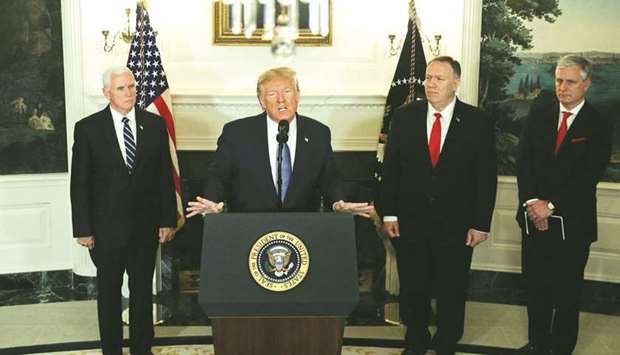Russian military police started deploying on Syria’s northeast border yesterday under a deal with Turkey to drive Kurdish fighters from the region, and US President Donald Trump said Turkey’s offensive against the Kurdish forces was over.
Just two weeks after Trump pulled out US special forces, allowing Turkish troops to sweep into northeast Syria and target Washington’s former Kurdish allies, Russia’s police deployment shows how swiftly the balance of power in the area has shifted.
Turkey ‘paused’ its offensive last week under a US-brokered deal which called for Kurdish YPG fighters to withdraw, and then secured Russian support this week for a wider deal requiring the YPG’s removal from the whole northeast border.
In an address from the White House, Trump said Turkey had announced it was making last week’s ceasefire permanent, paving the way for the United States to lift sanctions it had imposed on Turkish imports in response to the cross-border assault.
“Early this morning, the government of Turkey informed my administration that they would be stopping combat and their offensive in Syria, and making the ceasefire permanent,” Trump said, adding that he had given instructions to lift sanctions on Ankara “unless something happens that we are not happy with”. The police arrival in Kobani marked the start of a mission by Russian and Syrian security forces to push the YPG at least 30km into Syria under an accord reached on Tuesday by presidents Vladimir Putin and Tayyip Erdogan.
It also underlines Putin’s dominant influence in Syria and seals the return of his ally President Bashar al-Assad’s forces along the northeastern border for the first time in years.
A complete pullout of the YPG, which Ankara considers terrorists because of their links to insurgents inside Turkey, would mark a victory for Erdogan who has said he is seeking to create a “safe zone” for the return of Syrian refugees.
Kobani, where the Russian military police deployed, is of special significance to the Kurdish fighters, who fought off Islamic State militants trying to seize the city in 2014-15 in one of the fiercest battles of Syria’s conflict.
Next Tuesday, Russian and Turkish forces will jointly start to patrol a 10km strip of land in northeast Syria where US troops had long been deployed along with their former Kurdish allies. Kurdish militia commanders have yet to respond to the deal reached in Russia’s Black Sea resort of Sochi, and it was not immediately clear how their withdrawal could be enforced. Kremlin spokesman Dmitry Peskov said if Kurdish forces did not retreat, Syrian border guards and Russian military police would have to fall back.”And remaining Kurdish formations would then fall under the weight of the Turkish army,” he said.
In a swipe at Washington, which has called into question how the deal will be guaranteed, Peskov said: “Now they (the Americans) prefer to leave the Kurds at the border and almost force them to fight the Turks.”
The Kurdish-led SDF were Washington’s main allies in the fight to dismantle Islamic State’s self-declared caliphate in Syria.
Trump’s decision to pull troops out was criticised by US lawmakers, including fellow Republicans, as a betrayal.
SDF commander Mazloum Kobani said yesterday Trump had promised to maintain long-term support for the Kurdish-led forces, who have controlled large swathes of northeastern Syria.
In a sign of growing ties between Ankara and Moscow, the head of Russia’s defence sales agency was quoted by Interfax news agency as saying Moscow could deliver more S-400 missile defence systems to Turkey.
Turkey, a Nato member, has already been frozen out of a programme to buy and help produce F-35 jets and faces possible US sanctions for buying the S-400 systems, which Washington says are incompatible with Nato’s defences and threaten the F-35 if operated near the stealth fighter.
In an interview with Reuters, Defence Minister Hulusi Akar said the disagreements over the F-35 could be overcome.
“We are at the centre of Nato, and we remain determined to carry out all of our responsibilities fully. We are going nowhere,” he said.
While Tuesday’s deal addresses Turkey’s call for the YPG to be pushed back from the border, it also means Ankara will have to deepen its security co-ordination with Damascus.
Turkey may also have to moderate its own military ambitions in the region.
Turkish security sources said Ankara was re-evaluating a plan to set up 12 observation posts in northeastern Syria in the wake of the deal. Russia’s Defence Ministry later said the Syrian government would set up 15 posts on the border. Assad and Putin have both said Turkish forces cannot remain in Syria in the long term.
“The most significant part of the Russian-Turkish agreement is the arrival of the Syrian border guard to the northeast, something both Damascus and Russia sought for a long time,” said Yury Barmin, a Middle East specialist at Moscow Policy Group.

US President Donald Trump delivers a statement on the conflict in Syria as Vice President Mike Pence, Secretary of State Mike Pompeo and White House National Security Adviser Robert O’Brien stand by in the Diplomatic Room of the White House in Washington, yesterday.
